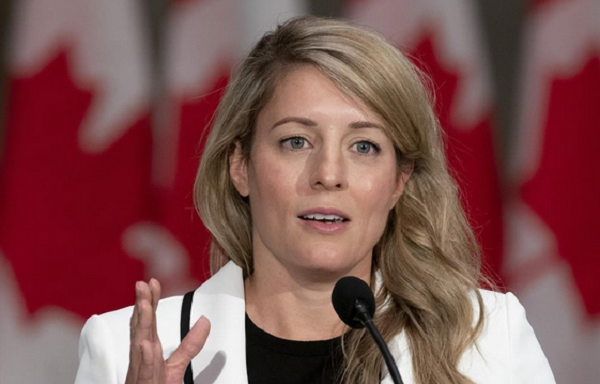‘There’s nothing new’: Canada reacts to Trump saying tariffs may come Feb. 1
Hours after his inauguration, U.S. President Donald Trump is floating the date of Feb. 1 as the day he plans to slap Canada and Mexico with a 25 per cent tariff – and the federal government says Trump’s latest comment is not a surprise.
“We took note, obviously, of what President Trump said earlier today in Washington. None of this should be surprising,” Finance Minister Dominic LeBlanc said Monday to reporters – moments after Trump’s remarks – at a Liberal cabinet retreat in Montebello, Que.
“The one thing we’ve learned is that President Trump, at moments, can be unpredictable.”
Trump made the statement while signing executive orders at the White House Monday night, citing illegal migration and the trafficking of fentanyl at the border.
But just hours prior, federal and provincial leaders expressed tepid optimism following U.S. media reports that Trump would only sign a memorandum telling federal agencies to study trade issues with Canada, Mexico and China.
One senior Canadian government source told CTV News they had hoped Trump wouldn’t act immediately, instead signaling he wanted to study the cross-border trade dynamic, and that Canada could potentially have up to six months of tariff reprieve.
But speaking to reporters late Monday, LeBlanc said “there’s nothing new this evening than was different than a week ago.”
“We have spent the last number of weeks preparing potential response scenarios for the Government of Canada in partnership with provinces and Canadian business leaders and union leaders,” LeBlanc said. “So our country is absolutely ready to respond to any one of these scenarios.”
Also speaking to reporters Monday night, Foreign Affairs Minister Melanie Joly says she wanted to reassure Canadians that the federal government has a plan.
“We need to continue to fight for our interests, to defend jobs across the country, and we’re calling every single political leader across the board, across the country, to stand united,” Joly said.
Earlier, Joly told CTV’s Power Play that the Canadian government had received no direct assurances beyond the U.S. media reports about Trump not levelling tariffs on day one.
Trump pledges to ‘overhaul’ trade system
Last November, Trump wrote in a social media post he’d implement a 25 per cent tariff on all imports from Canada and Mexico as one of “many” executive orders on day one of his second term.
The threat prompted Canada to mount a coordinated response to the president, including a rare in-person meeting with Prime Minister Justin Trudeau and the premiers last week. Trudeau also reconvened his cabinet committee on Canada-U.S. relations, and struck a new Canada-U.S. relations council, comprised of 18 prominent Canadians.
The Wall Street Journal and other outlets reported Monday morning that Trump planned to hold off on implementing the tariffs. The reporting indicated that Trump intended to issue a “broad memorandum,” directing federal agencies to study U.S. trade policies — including outlining any trade deficits — and singling out America’s relationship with China, Mexico, and Canada for scrutiny.
“I will immediately begin the overhaul of our trade system to protect American workers and families instead of taxing our citizens to enrich other countries, we will tariff and tax foreign countries to enrich our citizens,” Trump said in his inauguration speech on Monday.
“For this purpose, we are establishing the External Revenue Service to collect all tariffs, duties and revenues, it will be massive amounts of money pouring into our treasury coming from foreign sources,” he added.
Awaiting Trump’s initial action, Trudeau’s cabinet pre-emptively gathered in Montebello to be able to rapidly respond and continue the high-priority discussions on relations with the incoming administration.
When asked earlier how long they believed they can stave off Trump’s tariffs, neither Joly nor LeBlanc would directly say, pointing instead to the work they’ve been doing to engage with Trump’s incoming administration.
The Canadian government has been readying a three-phased counter-tariff response to roll out as early as inauguration day, depending on whether, and how severely, Trump followed through on his previous threats.
In a brief statement to reporters on his way into the meeting space on Monday, Trudeau said he was “very happy to be in Montebello,” and to “dig in on issues facing Canadians,” but he did not mention Trump specifically.
Trudeau did congratulate the 47th U.S. president on his inauguration Monday, lauding the relationship Canada-U.S. relationship as “the world’s most successful economic partnership.”
“We are each other’s largest trade partners, with a relationship that creates millions of jobs, attracts billions in investment into the continent, and keeps our people safe,” Trudeau wrote in a statement Monday, adding he looks forward to working with Trump during the latter’s second term.
‘He’s coming for us’: Premier Ford
Ontario Premier Doug Ford, who wore a ballcap reading “Canada is not for sale” at last week’s First Ministers’ meeting, told reporters at Queen’s Park on Monday, ahead of Trump’s evening declaration, that he was even more uncertain now about Trump’s next moves, citing the contents of his speech.“
He did say that he’s going to apply tariffs across the board, and I feel he’s going to be targeting Canada, specifically Ontario, because we’re the manufacturing might,” Ford said. “And it’s very concerning.”
Ford has been publicly pushing back against Trump and his tariff threat, as well as the president’s comments about using “economic force” to annex Canada.
“These are going to be negotiations that are going to go on for quite some time right now,” Ford said. “Make no mistake about it, he’s coming for us. Is it tomorrow? Or is it a month down the road? But it’s very concerning.”
Ford has previously threatened to cut off electricity from his province to 1.5 million homes across three U.S. states as a “last resort” response to the tariffs. He later explained that his comments were about standing up for Canadian workers.
The premier has since pitched an energy plan, dubbed “Fortress Am-Can,” which would build upon Ontario’s existing nuclear infrastructure to deliver more power south of the border.
Ford said Trump’s new External Revenue Service — which the premier called “another threat” — adds even greater uncertainty, specifically to companies that may be looking to invest in Ontario, because they won’t know how the tariffs might affect their company.
Canada needs to address ‘irritants’: Premier Smith
Also speaking earlier, Alberta Premier Danielle smith — who is in Washington, D.C., to attend the inauguration and recently visited Trump at his Florida estate, Mar-a-Lago — was more optimistic Canada could avoid the tariffs altogether if new measures were put in place.
In an interview with CTV News Chief Political Correspondent Vassy Kapelos, Smith said while Canada had escaped the promised day-one tariffs, it couldn’t take anything for granted.
“There’s still obviously irritants in the relationship between Canada and the U.S., and I think this gives us an opportunity to address some of those,” Smith said, pointing to border security, illegal drugs and migrants, and Canada’s still-unmet NATO defence spending commitments.
Smith refused to sign the joint communique with the other premiers until the federal government takes the proposal of restricting energy exports to the U.S. off the table.
She said Monday she believes it’ll more beneficial going forward to emphasize the benefits of the cross-border relationship — as opposed to ratcheting up the rhetoric around Canada’s potential retaliatory measures — to avoid the application of tariffs altogether.
This article was first reported by CTV News













